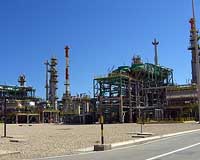 |
Algiers, Algeria (UPI) Sep 23, 2010 Algeria has launched its third oil and gas licensing round and hopes it will revive the fortunes of the country's scandal-hit energy industry after a purge of top officials in what is widely seen as a political power struggle. The previous bidding rounds, in 2008 and 2009, were a fizzle with few international oil companies showing interest in the blocks that were offered. The government blamed global economic woes for the poor showing. But many of the oil companies complained that the terms demanded by Algeria's state oil company, Sonatrach, weren't deemed too stiff to be worth the risks. Industry experts suspect that Sonatrach is unlikely to make major changes in its terms this time around. But much will depend on what blocks are put on offer. Ten blocks are on offer, the Middle East Economic Digest reports, but the contractual conditions won't be known until a Sept. 30 meeting with interested companies in Algiers. Further "clarification meetings" will be between October and December, with opening of the bids scheduled for March 3. Africa Energy Intelligence, a Paris Web site that monitors the continent's energy industry, reported in early September that some 70 companies were qualified to bid. These included Exxon Mobil of the United States, Royal Dutch Shell, Total of France, Gazprom of Russia, BP, Repsol of Spain and ENI of Italy. Under Algeria's revised 2006 Hydrocarbons Law, Sonatrach has a 51 percent stake in all upstream operations and there's a tax of every barrel of oil sold at more than $30. MEED said that in the 2009 bidding round, the National Agency for Valorization of Hydrocarbon Resources, known by the acronym Alnaft, also demanded the international companies offer assets abroad as part of any deal. That was later set aside following complaints from the companies, MEED said. "If there is one thing that Algeria cannot afford, it is the mismanagement of its hydrocarbons reserves," MEED observed. "It is imperative that the third licensing round is a success." Algeria has proven oil reserves of 12.27 billion barrels as well as natural gas reserves of 4.51 trillion cubic meters. Oil and gas account for 97.5 percent of the country's export earnings and Sonatrach is the biggest employer in Africa with 120,000 employees. Algeria is the world's third largest exporter of liquefied petroleum gas, the fourth largest exporter of liquefied natural gas and ninth largest oil exporter. Sonatrach's problems began in December when the national intelligence service, known as the DRS and controlled by the Defense Ministry, launched an investigation of the company's senior management for alleged corruption and irregularities in awarding contracts. The company is a powerful state monopoly and a pillar of Algeria's energy-based economy and the probe paralyzed the decision-making process at a time when the oil and gas industry needed energetic leadership. Corruption probes are a regular occurrence in Arab countries but these are usually politically driven and involve rival power centers or clans within the ruling elite seeking to settle scores or enrich themselves. Sonatrach President and Chief Executive Officer Mohammed Meziane and his top management team, who by all accounts were efficient managers, were all dismissed. Meziane, his two sons and former Sonatrach vice presidents Belkacem Boumedienne and Benamar Zenasni are all behind bars accused of embezzlement. Energy and Mines Minister Chakib Khelil was also dismissed. All are political allies of President Abdelaziz Bouteflika, who is at odds with the military and the DRS. He has sought to curb the authority of DRS chief Mohammed "Tewfik" Mediene, a longtime political foe, and to overhaul the security services as a counterweight against the generals, who until a few years ago held undisputed power. The new managers at Sonatrach are all seen as opponents of Khelil and Bouteflika. The new energy minister is Youcef Yousfi but few industry insiders expect any drastic changes in energy policy from him. That suggests the international oil companies will find little on Sept. 30 to encourage them to risk investing in new projects in Algeria. "Yousfi has a great opportunity to usher in his new regime but if the fiscal terms remain unattractive, IOCs will continue to shun Algeria and look for a better deal elsewhere," MEED commented.
Share This Article With Planet Earth
Related Links Powering The World in the 21st Century at Energy-Daily.com
 Nanocatalyst Is A Gas
Nanocatalyst Is A GasHouston TX (SPX) Sep 23, 2010 A nanoparticle-based catalyst developed at Rice University may give that tiger in your tank a little more roar. A new paper in the Journal of the American Chemical Society details a process by Rice Professor Michael Wong and his colleagues that should help oil refineries make the process of manufacturing gasoline more efficient and better for the environment. In addition, Wong said, it cou ... read more |
|
| The content herein, unless otherwise known to be public domain, are Copyright 1995-2010 - SpaceDaily. AFP and UPI Wire Stories are copyright Agence France-Presse and United Press International. ESA Portal Reports are copyright European Space Agency. All NASA sourced material is public domain. Additional copyrights may apply in whole or part to other bona fide parties. Advertising does not imply endorsement,agreement or approval of any opinions, statements or information provided by SpaceDaily on any Web page published or hosted by SpaceDaily. Privacy Statement |